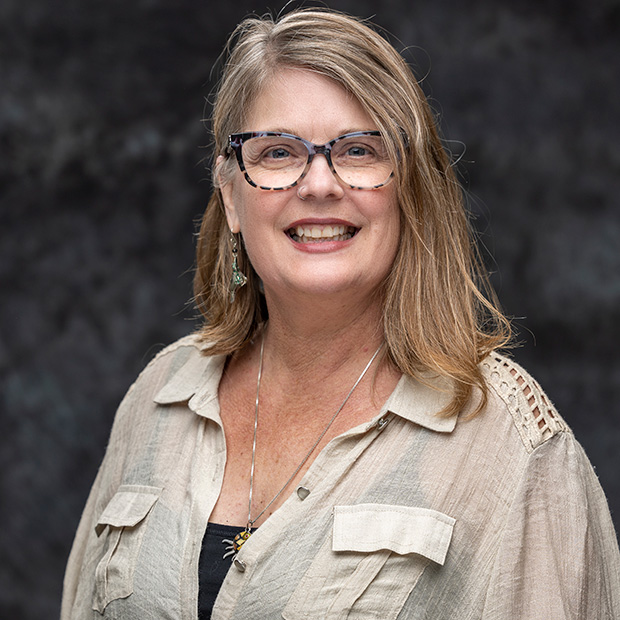Five Questions with Karen Edwards
April 17, 2025 — With recent changes in U.S. policy having an impact on Grinnell’s international students, Karen Edwards, dean of international student affairs & exchange visitors, provides answers to several pressing questions.
How is the current climate in the U.S. and globally impacting Grinnell’s international students?
 Karen Edwards
Karen Edwards
Grinnellians always ask such good questions. As respected news outlets feature the broad range of government policies and actions that threaten non-citizen students and scholars, my team in the Office of International Student Affairs (OISA) stands on the front lines to help our community navigate the impact. Students are appropriately apprehensive, and the OISA has extended written communication; revised advising materials that we post internally via sharepoint; offered well attended Q&A opportunities; and conducted an overwhelming number of individual appointments related to the issues listed below.
The United States has long celebrated deeply held values of cross-cultural learning, good will, and soft diplomacy that stem from global exchange. In addition, in the 2023-24 academic year, international students in the U.S. contributed $43.8 billion and supported 378,174 jobs. The impact of new immigration policies serve as ‘tariffs’ on U.S. higher education.
Your continued investment as active alum and intentional donors remains steadfast and essential – at Grinnell, and beyond. Please continue to ask good questions of your government representatives.
What are the biggest challenges that international students are currently facing when it comes to changes in U.S. federal policy?
The advent of ‘Enhanced Screening, Vetting, and Enforcement’ requires heightened attention and evolving precautions related to international travel; visa interviews for new students and visa renewals for many who travel mid-program; and work authorization applications and adjudication timelines for F-1 seniors and alumni using practical training benefits.
The evolution of “Additional Measures to Combat Anti-Semitism” coupled with new government interpretations about free-speech protections, FERPA limitations, and the use of AI to monitor non-citizen students and scholars, prompts serious questions and policy considerations for students, staff, faculty, and administration. Again, Grinnellians ask good questions like: What constitutes ‘political speech’? What information does or would the College share about me? How might my digital footprint, or the phone and computer that I carry, impact my travel risks?
Students, staff, and faculty have also voiced worries about how to handle potential visits from government officials, including ICE. In collaboration with Campus Safety, we have reviewed protocols, offered training, and worked to distribute Know Your Rights materials for students and essential campus partners.
Given the rapid changes in the environment, how are you and your team planning for potential disruptions that may impact international students?
New bills recently introduced to Congress are titled “Stop Chinese Communist Prying by Vindicating Intellectual Safeguards in Academics Act” (which could bar Chinese nationals from securing student visas); and “The Fairness for High Skilled Americans Act” (which would terminate invaluable Optional Practical Training benefits). Even if these bills don’t move to the Senate, they cause significant concern for current and prospective students.
Within recent weeks, reports of 4,700 cases of government-initiated visa revocations and SEVIS record terminations (as of today) have upended school officials and students across the country. SEVIS terminations are being executed as the result of non-deportable offenses, traffic violations, and political activity. The government’s communication to impacted students is threatening and the consequences are dire, with no clear avenue for appeal. My team is heavily invested in direct student support and related advocacy, in collaboration with professional networks and legal advisors.
Can you briefly describe some of the ways that OISA supports Grinnell’s international students, not just in navigating the U.S. Immigration System, but also adjusting to U.S. culture and finding belonging on campus?
The balance in support for positive cultural transitions and belonging coupled with essential compliance priorities is so important, and knowledge is power. My team and I work with intention to communicate essential new information for international students, F-1 alumni using practical training benefits, and exchange visitors who contribute to academic life.
Meanwhile, be assured, Grinnell’s commitment to our global student body is strong. We continue to support current students individually, and as a valued cohort within the larger community. Initiatives including our long-standing Friends of International Students (FIS) program; the International Pre-Orientation Program (IPOP); MOSAIC magazine; and our weekly Middle of Everywhere presentations are especially valuable in this moment. Jon Edwards, director of international admission, is in Asia to reinforce that message, and Grace Lloyd Roberston just returned from a recruitment trip in South America. In addition, my office and a multitude of campus partners are actively preparing to welcome new international students to campus in August.
How do you see international students finding joy this semester?
Perhaps the most significant challenge is to find balance in the storm. Academic demands and social activities already consume our brilliant and engaged student body. There are many sources of joy, in and beyond the classroom – co-curricular pursuits; special events like ISO Cultural Evening, Slavic Coffee House, or Pioneer Weekend; and annual editions of MOSAIC, Gouge, or the Grinnell Review. The list is long, and we continue to encourage students to prioritize these opportunities to learn, grow, and enjoy life.
—by Ellen de Graffenreid